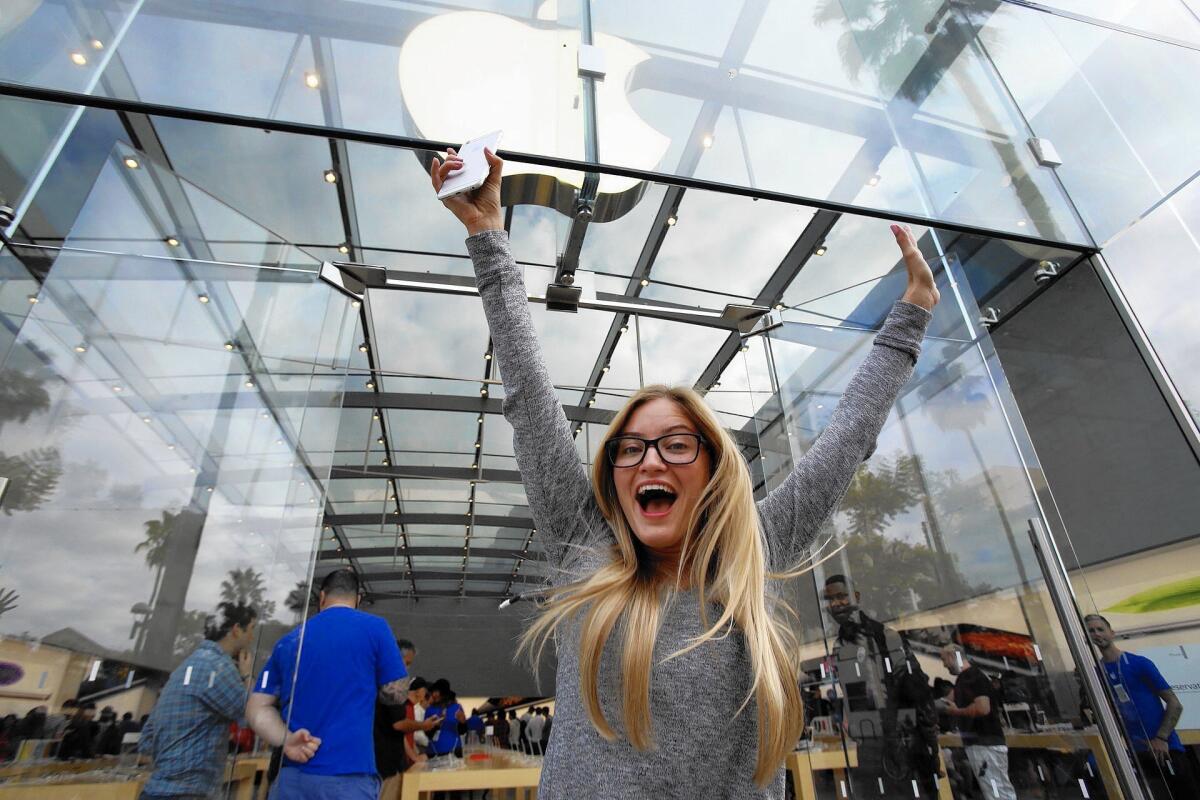Firms’ don’t-call-us policies speak volumes

- Share via
Expecting a company to actually speak with its customers is so 20th century.
Call me old school when it comes to customer service. I believe that when you treat people fairly and respectfully, they’ll keep bringing you their business. That means reasonable prices and high-quality products. It also means being accessible when there’s a problem.
That last notion, however, was tossed out the window by more than 43,000 consumers surveyed recently by the New York consulting firm Brand Keys, which for the last 18 years has ranked companies that are most successful at maintaining loyal customers.
This year’s “loyalty leaders” are Amazon (tablets, e-commerce), Apple (tablets, smartphones), YouTube (social networking), WhatsApp (instant messaging), Google (search), Kindle (e-readers), Samsung (smartphones) and Dunkin’ Donuts (at-home coffee).
The list is striking for its near-total dominance by tech companies. Dunkin’ Donuts must serve a darn fine cup of coffee to be running with this crowd.
But here’s what jumped out at me: Of the companies listed, all but two — Samsung and Dunkin’ Donuts — won’t pick up the phone. Ever.
In fact, good luck even getting a customer-service number for Amazon, Apple, Google, YouTube, WhatsApp and Kindle. The latter three are doubly hard to reach. YouTube is owned by Google and Kindle by Amazon. WhatsApp was acquired last year by Facebook, which also doesn’t want to speak with you.
These guys will interact with customers exclusively online, on their own terms, in their own sweet time. And if that’s not good enough or prompt enough for you, well, put it in an email.
I shared this observation with Robert Passikoff, Brand Keys’ founder and president. He had to think about it a moment.
“The paradigm for customer service has changed dramatically,” Passikoff acknowledged. “Digital interaction is everything.”
This can be frustrating for baby boomers, he said. The relatively prosperous members of the boomer generation grew accustomed to reaching out and touching someone by phone any time they had an issue with a company.
But the business world isn’t losing much sleep over wayward boomers, Passikoff said. These people already are monogamous with their companies of choice.
Businesses are much more eager to climb into bed with millennials, who may not have oodles of cash but are younger and therefore represent profits yet to come.
“Older consumers have adapted to mobile methods,” Passikoff said. “They’re also adapting to changes in how customer service is delivered.”
I’m no noob. I do most of my shopping online and am cool with digital communications. But I don’t mind saying that when I have a bone to pick with a business, I want someone on the line right away who can fix things.
I want to know that my complaint is being heard. I want to hear contrition when a company is wrong or, more typically, I want to be able to challenge an unsatisfying answer and place the service rep on the spot.
I’ve had more than my share of email exchanges with companies. The person at the other end frequently seems unqualified to address my problem — and there have been more than a few occasions in which I wasn’t even sure I was dealing with a living, breathing human being.
“As long as a company is responsive, I’m OK with email,” said Mary Gilly, a marketing professor at UC Irvine who focuses on consumer behavior. “It’s when they’re non-responsive that it’s a problem.”
She related a recent experience involving a failed effort to return something she bought online. The retailer’s website was vague about the procedures Gilly was required to follow.
“I emailed them but they didn’t email me back,” she said. “When I called, I could only leave a voice message. It was frustrating.”
Ron Hoverstad, an associate professor of marketing at University of the Pacific, said the disdain many businesses have for speaking with customers is illustrated by their use of automated switchboards.
“You get caught in those things; we all know what’s that’s like,” he said.
Companies increasingly turn to digital communication not because it’s the more effective means of dealing with customers but because it’s far cheaper than having call centers full of trained service reps, Hoverstad said.
“It may be the wave of the future,” he said, “but I don’t think it’s the smart way to go. Nothing can replace human contact.”
Apple seems to have learned this, Hoverstad said. The company may not want to give out its phone number, but it has opened Apple stores in many cities. Not coincidentally, Apple consistently ranks at or near the top of surveys of customer satisfaction.
“The companies with the most satisfied customers are the ones that make an effort to let you talk to a human being who is empowered to solve an issue,” Hoverstad said.
Unfortunately, those companies seem to be in the minority. More common are the ones that do their best to keep you at arm’s length or that allow you to speak only with some low-level, underpaid worker lacking both the knowledge and the authority to do anything but log a gripe.
I’m like any other consumer: I’m loyal to brands that consistently meet my needs. But I’m not so devoted that I won’t switch to a company that demonstrates it actually appreciates my business, rather than merely tolerates my presence.
Arrogant, don’t-call-us tech companies currently set the pace for brand loyalty. But the businesses that win the race, which is a marathon and not a sprint, are the ones that know how to cultivate relationships.
And here’s a quick tip: The website GetHuman provides numbers of many phone-shy firms. It’s not foolproof, but it’s worth a try.
David Lazarus’ column runs Tuesdays and Fridays. He also can be seen daily on KTLA-TV Channel 5 and followed on Twitter @Davidlaz. Send your tips or feedback to david.lazarus@latimes.com.
More to Read
Inside the business of entertainment
The Wide Shot brings you news, analysis and insights on everything from streaming wars to production — and what it all means for the future.
You may occasionally receive promotional content from the Los Angeles Times.











